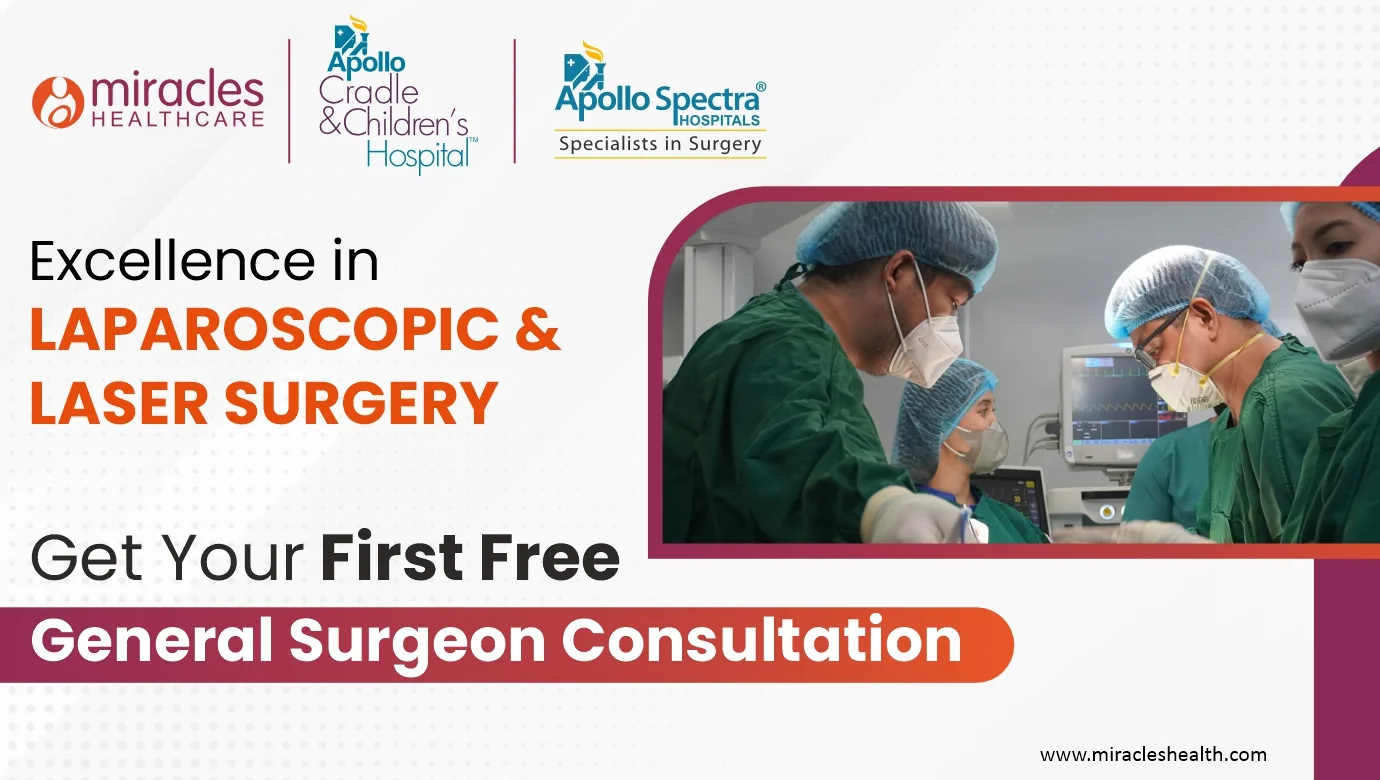General Surgery Conditions We Treat
Comprehensive Care for Your Health

Varicocele treatment options include conservative management, such as scrotal support and pain relief, or surgical interventions. Varicocele surgery options include varicocelectomy, performed through open surgery, laparoscopy, or microsurgery, to ligate the affected veins. The choice of treatment depends on symptom severity, infertility concerns, and patient preference.
Varicocele is an enlargement of the veins within the scrotum, similar to varicose veins in the legs, and is a common cause of male infertility. It often occurs in the left testicle due to anatomical differences in venous drainage. Symptoms of varicocele include a dull, aching pain, testicular atrophy, or a noticeable mass in the scrotum, although many cases are asymptomatic and discovered during a fertility evaluation.
Treatment for varicocele aims to relieve symptoms, improve fertility, and prevent testicular damage. Options include conservative management with scrotal support and analgesics for pain relief. For more definitive treatment, operation for varicocele is considered. Varicocelectomy, the most common procedure, involves tying off the affected veins to redirect blood flow. This can be performed through open surgery, and laparoscopically. The laparoscopic method is preferred due to its higher success rates and lower complication rates. The choice of treatment depends on the severity of symptoms, impact on fertility, and patient preferences.
Varicocele treatment is required under certain conditions to address symptoms and potential complications. Indications for treatment include:
Infertility: Varicocele is a common cause of male infertility. Treatment is considered if a man is experiencing difficulty conceiving and a varicocele is detected during evaluation.
Pain: Persistent, dull aching, or severe scrotal pain that affects daily activities and is not relieved by conservative measures warrants treatment.
Testicular Atrophy: If there is a noticeable reduction in the size of the affected testicle, treatment may be needed to prevent further damage.
Adolescent Concerns: In adolescents, treatment is recommended if there is evidence of testicular growth arrest or asymmetry, as early intervention can prevent future fertility issues.
Treatment decisions are personalized, taking into account the severity of symptoms, the impact on quality of life, and the individual's reproductive goals.
The right candidate for varicocele treatment typically falls into one of the following categories:
Men with Infertility Issues: Men who have been diagnosed with infertility and have a varicocele that may be affecting sperm quality and production are ideal candidates for treatment. Improving varicocele can improve sperm parameters and increase the chances of conception.
Men with Symptomatic Varicocele: Those experiencing significant discomfort or pain in the scrotum that affects their daily activities and does not respond to conservative management, such as scrotal support or painkillers, should consider treatment.
Adolescents with Testicular Growth Arrest: Young males who show signs of testicular atrophy or asymmetry during puberty may benefit from early intervention to prevent future fertility issues and ensure normal testicular development.
Men with Testicular Atrophy: Individuals with a noticeable reduction in the size of the affected testicle due to varicocele may need treatment to prevent further testicular damage and potential fertility problems.
The decision for treatment is tailored to the individual's symptoms, fertility goals, and overall health, and is made in consultation with a healthcare provider, typically a general surgeon.
Preparing for varicocele treatment involves several steps to ensure the procedure is safe and effective:
Consultation with a General Surgeon: Schedule a consultation with a general surgeon to discuss symptoms, treatment options, and the appropriate procedure for your specific case. The doctor will likely perform a physical examination and may request a semen analysis or scrotal ultrasound to assess the varicocele.
Medical History and Physical Examination: Provide a complete medical history, including any medications, allergies, and previous surgeries. The doctor will perform a physical exam and may order tests to ensure you are a good candidate for the procedure.
Preoperative Instructions: Follow any specific instructions given by your general surgeon, such as stopping certain medications a few days before surgery. Discuss any concerns or questions you have about the procedure and recovery process.
Fasting and Hydration: If undergoing surgery, you may be instructed to fast for several hours before the procedure. Ensure you understand the fasting guidelines provided by your healthcare team.
Comfortable Clothing: Wear loose, comfortable clothing on the day of the procedure to avoid pressure on the surgical area post-operatively. Consider bringing a scrotal support garment, which may be recommended after surgery.
Postoperative Care Preparation: Stock up on necessary supplies for aftercare, such as prescribed medications (pain relievers, antibiotics), ice packs for swelling, and over-the- counter pain relief options. Follow your doctor's advice on activity restrictions, wound care, and follow-up appointments to ensure a smooth recovery.
The procedure for varicocele treatment depends on the chosen method, which can include surgical or minimally invasive techniques. Here's an overview of the common procedures:
Open Surgery: This traditional approach involves making an incision in the groin or lower abdomen to access and ligate the affected veins. The surgeon may use a microscope for precision.
Laparoscopic Surgery: In this minimally invasive technique, small incisions are made in the abdomen, and a laparoscope and surgical instruments are inserted to locate and ligate the varicocele veins.
Microsurgical Varicocelectomy: Also known as subinguinal microsurgical varicocelectomy, this method offers high success rates and lower recurrence rates. It involves using a microscope to magnify the surgical field, enabling precise identification and ligation of the varicocele veins through a small incision in the groin area.
This minimally invasive procedure of varicocele surgery is performed by an interventional radiologist. A catheter is inserted into a vein, typically in the groin or neck, and guided to the varicocele veins using imaging techniques such as fluoroscopy or ultrasound. Once positioned, small coils or a sclerosing agent is injected to block off the abnormal veins, rerouting blood flow.
The choice of treatment procedure depends on factors such as the severity of the varicocele, patient preferences, and the expertise of the healthcare provider. Each technique has its benefits and potential risks, which should be discussed with a gynecologist before making a decision.
Treating varicocele can offer several advantages:
Improved Fertility: Varicocele treatment can enhance sperm quality and quantity, potentially improving fertility outcomes for men experiencing infertility due to varicocele-related issues.
Symptom Relief: For individuals experiencing discomfort, pain, or heaviness in the scrotum, varicocele treatment can relieve these symptoms, improving overall quality of life and daily functioning.
Prevention of Complications: Treating varicocele can help prevent potential complications such as testicular atrophy (shrinkage), which may occur over time if left untreated, particularly in adolescents.
Enhanced Testicular Health: By restoring normal blood flow and reducing venous congestion, varicocele treatment can help maintain optimal testicular function and health, potentially reducing the risk of future complications.
Psychological Benefits: Addressing varicocele-related concerns can relieve anxiety and stress associated with infertility or chronic scrotal discomfort, leading to improved mental well-being.
Potential Improvement in Sexual Function: Some individuals may experience improvements in sexual function and satisfaction following varicocele treatment, although this can vary depending on individual circumstances.
Overall, varicocele treatment offers the potential for improved reproductive health, symptom relief, and overall well-being, making it a valuable option for eligible individuals.
After varicocele treatment, patients can expect varying experiences depending on the chosen procedure and individual factors. Here's a general overview of what to expect:
Recovery Period: The recovery time can vary depending on the type of treatment. For minimally invasive procedures like percutaneous embolization, recovery may be quicker compared to open or laparoscopic surgery. Generally, patients can expect to resume normal activities within a few days to a couple of weeks following treatment.
Discomfort and Pain: Some discomfort, swelling, or mild pain in the scrotum or groin area is common after varicocele treatment. It can be managed with over-the-counter pain medications and ice packs. However, if the pain continues or becomes severe, it's important to contact your general surgery specialist.
Follow-up Appointments: Patients typically have follow-up appointments with their surgeon to monitor recovery progress, assess any complications, and discuss post- treatment care instructions.
Resumption of Activities: Patients are generally advised to avoid heavy lifting and strenuous activities for some time following treatment to allow for proper healing. The varicocele specialist doctor will provide specific guidelines based on your procedure and individual circumstances.
Improvement in Symptoms: Many patients experience relief from symptoms such as scrotal discomfort, pain, or swelling following varicocele treatment. However, it may take some time for full resolution of symptoms, and individual experiences can vary.
Fertility Outcomes: For individuals undergoing varicocele treatment for infertility, it's important to understand that improvements in sperm parameters and fertility may take several months to become apparent. Follow-up semen analysis may be recommended to assess changes in sperm quality and quantity over time.
Potential Complications: While uncommon, complications such as infection, bleeding, or recurrence of varicocele can occur after treatment. It's important to follow post- treatment care instructions carefully and contact your varicocele specialist doctor if you experience any concerning symptoms.
Overall, most patients can expect a successful outcome with a resolution of symptoms and potential improvements in fertility following varicocele treatment, with proper post-treatment care and monitoring.
Varicocele treatment is generally considered safe, but like any medical procedure, it carries some risks and potential complications. These can vary depending on the type of treatment chosen and individual factors. Common risks associated with varicocele treatment may include:
Surgical Risks: For varicocelectomy procedures (open, laparoscopic, or microsurgical), there are inherent risks associated with surgery, such as bleeding, infection, or adverse reactions to anesthesia. In rare cases, injury to surrounding structures such as arteries, nerves, or the spermatic cord may occur.
Pain and Discomfort: Following treatment, some patients may experience temporary pain, discomfort, or swelling in the scrotum or groin area. This usually resolves with time but may require pain management strategies such as medications or ice packs.
Recurrence: Although uncommon, varicocele may recur after treatment, particularly with less invasive techniques such as percutaneous embolization. Repeat procedures may be necessary if varicocele recurrence occurs.
Hydrocele Formation: In some cases, fluid accumulation around the testicle (hydrocele) may occur after varicocele treatment, leading to swelling and discomfort. This is usually temporary but may require drainage or further treatment if persistent.
Infection: There is a risk of infection at the incision site or within the scrotum following surgical procedures. This risk is minimized with proper wound care and hygiene practices.
Damage to Surrounding Structures: During surgery, there is a small risk of unintentional damage to nearby structures such as blood vessels, nerves, or the testicular artery, which could affect fertility or testicular function.
Spermatic Cord Injury: Rarely, injury to the spermatic cord during surgery may occur, potentially leading to complications such as chronic pain or impaired blood flow to the testicle.
Anesthesia Risks: For procedures performed under general anesthesia or sedation, there is a slight risk of adverse reactions to anesthesia, including allergic reactions or respiratory complications.
Before undergoing varicocele treatment, discuss potential risks and complications with a general surgeon and weigh these against the expected benefits.
Varicocele treatment is affected by a combination of factors, which can be broadly categorized into patient-related factors, varicocele characteristics, and treatment options. Here’s a detailed overview of the factors:
Age: Younger patients, especially adolescents, may be more likely to benefit from treatment to prevent potential future fertility issues.
Symptoms: The presence and severity of symptoms such as pain, testicular atrophy, or discomfort can guide the decision for treatment.
Fertility Status: Men who are experiencing infertility or have abnormal semen parameters are more likely to undergo treatment.
Health Status: Overall health, including the presence of other medical conditions, can influence treatment options and outcomes.
Grade of Varicocele: Varicoceles are graded I (small) to III (large) based on their size and palpability. Larger varicoceles are more likely to cause symptoms and fertility issues, potentially necessitating treatment.
Bilateral vs. Unilateral: Bilateral varicoceles might have a greater impact on fertility and symptoms compared to unilateral varicoceles.
Duration of the Condition: Long-standing varicoceles might have caused more significant damage to testicular function, influencing the urgency and type of treatment.
Surgical Methods: operation for varicocele can be done with different surgical methods including open surgery (such as varicocelectomy), microsurgical varicocelectomy, and laparoscopic surgery. Microsurgical techniques tend to have lower recurrence and complication rates.
Non-Surgical Methods: Embolization is an option for varicocele treatment without surgery involving the use of coils or sclerosing agents to block the affected veins.
Efficacy and Risks: Different treatment methods vary in their success rates, risk of complications, and recovery times. Microsurgical varicocelectomy, for instance, has high success rates with fewer complications but requires a skilled surgeon.
Technological Availability: The availability of certain techniques and technologies.
Cost and Insurance Coverage: The cost of treatment and whether it is covered by insurance can influence the choice of treatment.
Patient Preference: Individual preferences regarding treatment invasiveness, recovery time, and potential outcomes can guide the choice of treatment.
Follow-Up Care: Regular follow-up is necessary to monitor for recurrence and manage any complications.
Lifestyle Adjustments: Post-treatment recommendations may include lifestyle changes to support recovery and prevent recurrence.
Miracles Apollo Cradle/Spectra is the best hospital for varicocele treatment in Gurgaon. Our facility is equipped with state-of-the-art medical technology and offers a comprehensive range of healthcare services including varicocele treatment ensuring that patients receive the highest quality of care. We have a team of highly experienced general surgery doctors, who are experts in providing varicocele treatment. Our specialists use the latest surgical techniques and minimally invasive procedures to treat varicocele, aiming to provide relief with minimal discomfort and a quick recovery time.
Our doctors offer personalized treatment plans tailored to the specific needs and medical history of the patient. From initial diagnosis to post-treatment care, our team is committed to supporting patients every step of the way, ensuring a smooth and successful treatment journey.


Comprehensive Care for Your Health
Meet our expert team of General Surgeon where compassionate care meets expertise.
Inspiring Journeys: True Patient Stories
Miracles Apollo Cradle is a leading Maternity Hospital Gurgaon. We strive to give the best care to our patients.






Your Health, Our Network: Comprehensive Care Across Every Facility.
Learn about the world class health care we provide
Expert Advice and Health Tips
Learn about the world class health care we provide
The cost of laser treatment for varicose veins varies depending on the extent of the condition, the experience of the surgeon, and the location of the clinic.
Varicocele can sometimes be managed with medications and lifestyle changes, but these do not fix the underlying issue.
Varicocele surgery usually involves mild to moderate pain, which is manageable with pain medication.
The cost of varicocele surgery in Gurgaon varies depending on several factors such as the location of the hospital and the experience of the surgeon.
Varicocele occurs due to enlarged veins in the scrotum caused by faulty valves, leading to poor blood circulation and increased testicular temperature.
Surgical repair or embolization is the best treatment for varicocele.
A grade 3 varicocele is a large varicocele that is easily visible and palpable.
Most people can live a normal life after recovery from varicocele surgery.
Varicocele treatment includes surgical options like varicocelectomy and non-surgical methods like embolization to improve blood flow and relieve symptoms.
Non-surgical treatments include lifestyle changes, scrotal support, pain management, pelvic exercises, and embolization, a minimally invasive procedure.